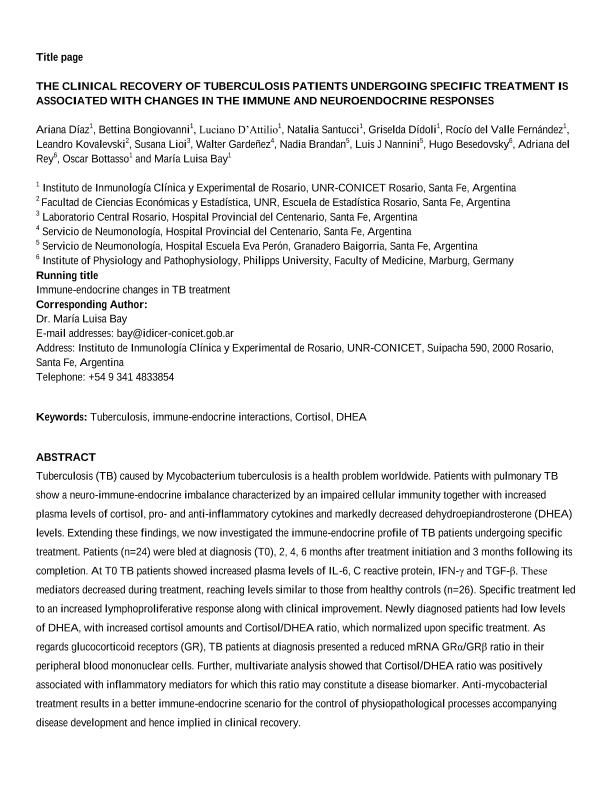Artículo
The clinical recovery of tuberculosis patients undergoing specific treatment is associated with changes in the immune and neuroendocrine responses
Díaz, Ariana ; Bongiovanni, Bettina
; Bongiovanni, Bettina ; D'attilio, Luciano David
; D'attilio, Luciano David ; Santucci, Natalia Estefanía
; Santucci, Natalia Estefanía ; Dídoli, Griselda; Fernández, Rocío del Valle
; Dídoli, Griselda; Fernández, Rocío del Valle ; Kovalevski, Leandro; Lioi, Susana; Gardeñez, Walter; Brandan, Nadia; Nannini, Luis J.; Besedovsky, Hugo; del Rey, Adriana; Bottasso, Oscar Adelmo
; Kovalevski, Leandro; Lioi, Susana; Gardeñez, Walter; Brandan, Nadia; Nannini, Luis J.; Besedovsky, Hugo; del Rey, Adriana; Bottasso, Oscar Adelmo ; Bay, Maria Luisa
; Bay, Maria Luisa
 ; Bongiovanni, Bettina
; Bongiovanni, Bettina ; D'attilio, Luciano David
; D'attilio, Luciano David ; Santucci, Natalia Estefanía
; Santucci, Natalia Estefanía ; Dídoli, Griselda; Fernández, Rocío del Valle
; Dídoli, Griselda; Fernández, Rocío del Valle ; Kovalevski, Leandro; Lioi, Susana; Gardeñez, Walter; Brandan, Nadia; Nannini, Luis J.; Besedovsky, Hugo; del Rey, Adriana; Bottasso, Oscar Adelmo
; Kovalevski, Leandro; Lioi, Susana; Gardeñez, Walter; Brandan, Nadia; Nannini, Luis J.; Besedovsky, Hugo; del Rey, Adriana; Bottasso, Oscar Adelmo ; Bay, Maria Luisa
; Bay, Maria Luisa
Fecha de publicación:
10/2017
Editorial:
Oxford University Press
Revista:
Pathogens and Disease
ISSN:
2049-632X
Idioma:
Inglés
Tipo de recurso:
Artículo publicado
Clasificación temática:
Resumen
Tuberculosis (TB) caused by Mycobacterium tuberculosis is a health problem worldwide. Patients with pulmonary TB show a neuro-immune-endocrine imbalance characterized by an impaired cellular immunity together with increased plasma levels of cortisol, pro- and anti-inflammatory cytokines and markedly decreased dehydroepiandrosterone (DHEA) levels. Extending these findings, we now investigated the immune-endocrine profile of TB patients undergoing specific treatment. Patients (n = 24) were bled at diagnosis (T0), 2, 4, 6 months after treatment initiation and 3 months following its completion. At T0, TB patients showed increased plasma levels of interleukin-6 (IL-6), C reactive protein, interferon-gamma (IFN-γ) and transforming growth factor beta (TGF-β). These mediators decreased during treatment, reaching levels similar to those from healthy controls (n = 26). Specific treatment led to an increased lymphoproliferative response along with clinical improvement. Newly diagnosed patients had low levels of DHEA, with increased cortisol amounts and cortisol/DHEA ratio, which normalized upon specific treatment. As regards glucocorticoid receptors (GR), TB patients at diagnosis presented a reduced mRNA GRα/GRβ ratio in their peripheral blood mononuclear cells. Furthermore, multivariate analysis showed that cortisol/DHEA ratio was positively associated with inflammatory mediators for which this ratio may constitute a disease biomarker. Anti-mycobacterial treatment results in a better immune-endocrine scenario for the control of physiopathological processes accompanying disease development and hence implied in clinical recovery.
Palabras clave:
Cortisol
,
Dhea
,
Immune-Endocrine Interactions
,
Tuberculosis
Archivos asociados
Licencia
Identificadores
Colecciones
Articulos(IDICER)
Articulos de INSTITUTO DE INMUNOLOGIA CLINICA Y EXPERIMENTAL DE ROSARIO
Articulos de INSTITUTO DE INMUNOLOGIA CLINICA Y EXPERIMENTAL DE ROSARIO
Citación
Díaz, Ariana; Bongiovanni, Bettina; D'attilio, Luciano David; Santucci, Natalia Estefanía; Dídoli, Griselda; et al.; The clinical recovery of tuberculosis patients undergoing specific treatment is associated with changes in the immune and neuroendocrine responses; Oxford University Press; Pathogens and Disease; 75; 7; 10-2017; 75-77
Compartir
Altmétricas



